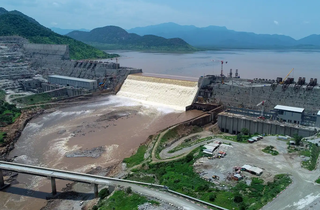Kifle Horo, the project manager of GERD, revealed to the state-run media outlet Ethiopian Press Agency that the construction of the massive hydroelectric project is nearing completion, with an expected finishing timeline of within the next seven months.
Horo noted that the civil construction work on the dam is currently 99 percent complete, while the electromechanical work stands at around 78 percent completion.
The GERD project, which broke ground in April 2011, holds significant importance in Ethiopia's development agenda, aiming to tap into the country's abundant water resources for electricity generation.
Situated on the Blue Nile River in Ethiopia's Benishangul-Gumuz region, near the Sudanese border, the GERD is poised to be a transformative force in Ethiopia's energy sector.
The primary objective of the GERD is to address Ethiopia's substantial energy deficit, with only half of the population currently having access to electricity. Upon its completion, the dam is projected to produce an impressive 5,150 megawatts of power, effectively doubling the country's current generation capacity. This not only promises to illuminate millions of Ethiopian households but also opens up avenues for potential electricity exports to neighboring nations, fostering regional cooperation and development.
However, the GERD project is not without its complexities. Disputes, particularly with downstream countries Egypt and Sudan, have arisen over concerns about the dam's potential impact on water flow in the Nile River, vital for irrigation and drinking water supply. Negotiations regarding water rights and the filling of the dam have been ongoing for years, highlighting the intricate challenges surrounding water management and regional cooperation.
Despite these challenges, the GERD represents a significant milestone in Ethiopia's quest for economic and social advancement. The project holds the potential to alleviate the electricity shortage, enhance living standards, and generate crucial revenue. However, addressing the concerns of downstream nations and ensuring sustainable water management will be imperative for the project's long-term success and fostering cooperation in the Nile basin.
As Ethiopia aims to commission the GERD later this year, the coming months will be pivotal in shaping the future trajectory of this ambitious endeavor. (ILKHA)



 Dünya
Dünya
 Dünya
Dünya
 Güncel
Güncel
 Dünya
Dünya
 Güncel
Güncel
 Eğitim
Eğitim
 Dünya
Dünya
 Güncel
Güncel
 Dünya
Dünya
 Dünya
Dünya





